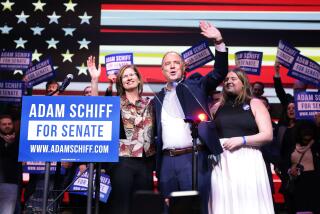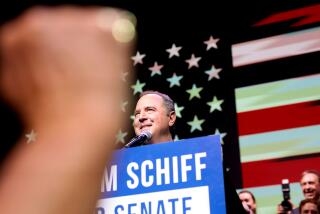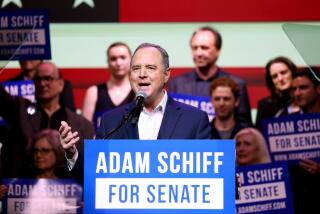Campbell’s Low-Key Race Worries GOP
Before going public with his plan to run for the U.S. Senate, Republican Congressman Tom Campbell paid a courtesy call on Democrat Dianne Feinstein in her Washington, D.C., office. He was going to run against her, he said. But his campaign would be a contest of ideas, not a mud-wrestling match.
“I said, ‘I’m not going to [attack] either,’ ” Feinstein said last week.
Thus, the stage was set for one of the most tepid Senate races in years. One Republican strategist called it a “10 on the snore meter.” Polls show that more Californians are tuned into the Hillary Rodham Clinton-Rick Lazio race in New York than the Campbell-Feinstein contest.
The strategy has so far served Feinstein, who has incumbency and name recognition on her side. The latest polls show her ahead by 20 points.
Campbell, a moderate with a professorial style befitting his first career as a Stanford law professor, knows he needs to raise his profile and hopes the two debates scheduled with Feinstein this week will help. The first debate is today at 11 a.m. in Santa Monica, broadcast on cable channels including CSPAN; the second is Friday evening in San Francisco.
Some Republican observers have openly questioned Campbell’s low-key campaign, his personal style and the issues he’s chosen to emphasize. Once seen as a new-era Republican, critics say, he hasn’t yet connected with conservative Republicans or political moderates.
As a result, he has failed to gather momentum that would attract big donors. “Because he’s running such an unorthodox campaign . . . he hasn’t raised the big dollars to run a competitive race,” said Allan Hoffenblum, a conservative strategist. In a state of 34 million, Hoffenblum said, “you have to pay to get publicity.”
“The hardest thing to do in American politics is to defeat a sitting senator in a big state,” agreed Paul Maslin, a Democratic pollster. “The price of admission is so substantial [as] to make it difficult to get off the ground.”
Campbell’s soft-spoken, conversational style has also drawn criticism. “Everybody says they don’t want the candidates to mix it up,” said Republican consultant Ray McNally. “In reality, they do. The whole thing is set up to be adversarial.”
Because Campbell has failed to engage Feinstein, she has been able to employ a Rose Garden-type strategy. At many
appearances, Feinstein doesn’t even mention her opponent’s name.
*
Yet if Campbell is counting on a late knockout punch, no one has to warn him of the perils of becoming too aggressive--especially now, with Feinstein in a wheelchair, recovering from knee surgery.
“It is very difficult still . . . for a male candidate to judge how aggressive he can be because there’s a fine line between attacking your opponent and looking like you are beating up on a girl,” said veteran analyst Sherry Bebitch Jeffe.
As the challenger, Campbell has no choice but to address the incumbent and has recently launched his first significant television ad campaign, advocating a new drug policy and criticizing Feinstein as out of touch on the issue of how to attack America’s drug problem.
But his choice of the issue as a major campaign theme concerns many GOP loyalists. Indeed, Feinstein’s first television ads this fall carry more time-tested themes: strengthen schools, improve health care, stay tough on crime.
Another controversial Campbell position is his advocacy of reduced foreign aid to countries that can survive economically on their own--including Israel and Egypt--in favor of more money for poor African nations. That position infuriates conservative Jews.
“He’s running on issues he’s interested in, not on what Republicans are interested in or agree with him on,” said Hoffenblum.
Tony Quinn, a Republican analyst in Sacramento, said Campbell has ignored one issue he’s clearly got on his side: youth and vigor.
At 48, he’s nearly 20 years younger than the 67-year-old Feinstein. “A real criticism of Dianne Feinstein and Barbara Boxer is that they’re not big players in the Senate,” said Quinn. “A lack of energy is the best issue against her, and he’s not using it.”
All this is something of a surprise, considering that Campbell seemed made to order for what ailed the party after the crushing defeats of 1998, when Republicans lost both houses of the Legislature and failed to topple Democratic Sen. Barbara Boxer.
Amid the ruins, one Republican campaign official asked, “How the hell do we win?”
Up stepped Campbell, a different kind of Republican. Smart, thoughtful and just as concerned with those at the bottom of society as with the bottom line, Campbell was expected to appeal to young, forward- looking Californians. And he was from cyberville in San Jose, the land of forward thinkers and dream makers. The word maverick was hung around his shoulders early, and he relished it.
Still, even those who question his approach admit that you can’t make Campbell someone he’s not. What he is is a Stanford college professor who loves the give-and-take of policy debates and reviles the tendency in campaigns to reduce opponents to stereotypes. In fact, his willingness to stereotype his opponent in the 1992 Republican U.S. Senate primary, which he lost, is one of his enduring regrets as a politician. He vowed he would not do that again.
“He tends to be very civil,” said McNally. “He’s not a down and dirty street fighter. He knew when he got into the race it would be a formidable challenge.”
*
DEBATE
Dianne Feinstein and Tom Campbell will debate today at 11 a.m. The debate can be seen on C-SPAN.
More to Read
Get the L.A. Times Politics newsletter
Deeply reported insights into legislation, politics and policy from Sacramento, Washington and beyond. In your inbox three times per week.
You may occasionally receive promotional content from the Los Angeles Times.






